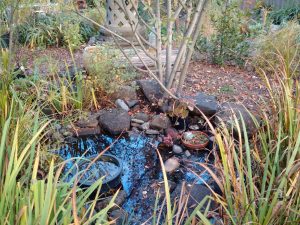Dear Yogis,
I was so excited I couldn’t wait to share this with you….
It is a beautiful day, and I thought I may go out in the garden this afternoon, if I have done all the writing I need to do. I am getting the garden ready for my new bee colony arriving in spring, even getting bee friendly plants growing so that they will feel at home and loved.

A friend gave me a bee book (by Bee Wilson), and although I was reluctant to have another book to read (they are piling up whilst I am stuck on Beatrix Potter), imagine my surprise and delight on flipping through and discovering a paragraph on “honeydew” (honey from heaven).
Last summer I told you about the connection I had made between the sugar exuded from aphids on certain trees in the garden and a wasp invasion. I had discovered this “rain of sugar” whilst sitting meditating under the tree with the wasps. The wasps were so busy with their collection, they couldn’t be bothered with me sitting in their space, and I enjoyed observing their behaviour around this particular tree. I couldn’t find any literature on this phenomenon, and no-one I spoke to had an inkling about it. I knew I couldn’t be the first to observe it, but I didn’t know what they were enjoying had been discovered and was known historically “honey-dew”.
In 1634 a Mr Charles Butler wrote about it and called it “the sweetest nectar which God doth distill miraculously out of the air” He noticed it occurring on oak trees, I haven’t seen it on oak trees, but I certainly pay attention now. Once I had got the right word for the miracle called honeydew, I could research and found it was also noticed by Galen in AD129. He said that the people of MtLibanus would spread animal skins on the ground to collect this “air honey” as it fell off the trees.
When I first discovered it last summer and followed the trail I realised it was being produced by grey black aphids being “farmed” by ants on certain trees around the pond. The aphids produced a honey tasting substance which fell like fine rain drops on me as I sat under the tree. It was this that attracted wasps to the garden. But the ants and aphis are determined to collect this sugar, and I have to brush the trees down daily to keep the aphid population down, and the wasps away. Butler and Galen were being very biblical in their musings, but it is actually a whole lot less appealing. It is actually aphid poo.
Apparently there are people who consider it a delicacy and it can be purchased at great expense at gourmet honey retailers. They market it as “heavenly sweat” as I presume “heavenly poo” would be a whole lot less appealing. Once you know what it is it really does taste like what it is. Yes, it is sweet, it is also “woody” or you could call this taste “poo’ey” and there is some doubt about whether it is really fit for human consumption. In my garden, the rain is not heavy enough that I could be bothered to lay out skins to collect it which is probably good because I would, but I have honey, so aphid poo is not a sugar source I rely on..
Take advantage of COVID. When you slow down, take time in the garden, and really pay attention to what is happening around you, it is amazing what you can discover. Go sit in your garden (rug up, it is cold out there).



